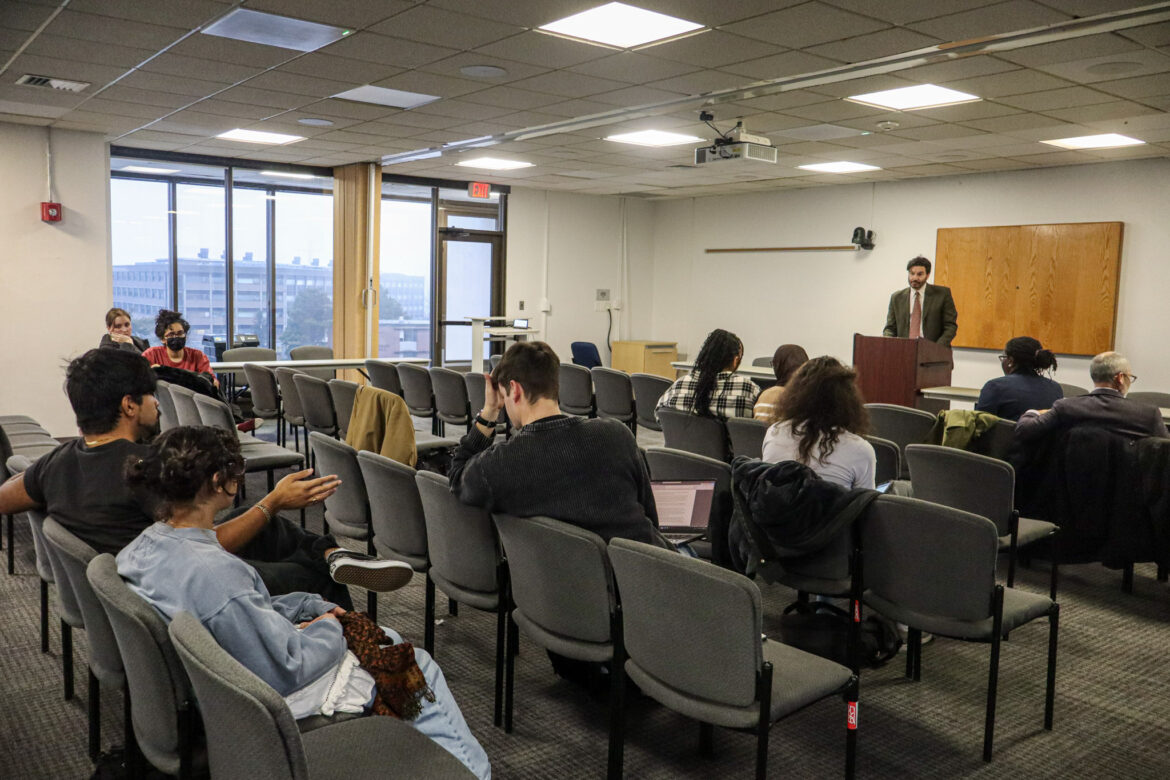The Student Government Association (SGA) held their much-anticipated Expressive Activity Policy Town Hall with President Jonathan Koppell on Dec. 9.
Koppell addressed student and faculty concerns regarding the revised Expressive Activity Policy, discussing topics ranging from student protester encounters with police, campus safety, the legality of campus speech and demonstration regulations.
The town hall was originally scheduled for Nov. 20, but was canceled and rescheduled due to an emergency in Koppell’s family. The new date was scheduled for Jan. 22, but due to the high demand from the student body, it changed to Dec 9.
Koppell opened the town hall with his personal interpretation of the importance of speech on college campuses.
“My belief is that [Montclair State] should be a place where people should have the right to express themselves,” Koppell said. “That is a fundamental part of any university community and particularly relevant when you’re talking about a public university because we as an instrumentality of the state of New Jersey, have to be consistent with the [United States] Constitution.”

President Koppell speaks to attendees at the Expressive Activity Town Hall on Dec.9. David Bien-Aime | The Montclarion
Fifteen students and one professor attended the town hall. All the students who asked questions declined to share their names both at the meeting and with The Montclarion.
A student highlighted their concerns following the policy and its enforcement as a student protester.
“In specific to the situations that happen, in that specific moment, is it okay for administration and officers to, if we are [acting] against this policy, are they allowed to enforce the policy by speaking to us in an authoritative way, like yelling or threatening us?” she said.
In response to the question, Koppell addressed following policy protocols.
“Officers shouldn’t be yelling at you, but there has to be a means by which we uphold the policy,” Koppell said.
Koppell also emphasized the importance of student safety on campus, and that demonstrators must comply with the times of previously scheduled campus events.
Adam Rzepka, an associate English professor affiliated with MSU4Palestine attended the town hall, questioning how the administration had the ability to update the Expressive Activity Policy, given the lawsuit settlement in 2021 that led to the previous policy.
“The settlement mandates that the university implement this exact Expressive Activity Policy, which is the one that you just replaced,” Rzepka said. “How is that possible?”

Associate English professor Adam Rzepka engaging with President Koppell during the town hall. David Bien-Aime | The Montclarion
President Koppell responded to the question by explaining that the current policy remains consistent with the previous policy.
“My understanding is that it lays out the parameters of what the policy has to be and that we’re consistent with the intention the policy had to be,” Koppell said.
A discussion around hate speech tolerance was brought up by a student, sharing how they were allegedly subjected to this treatment from peers.
“I, as a student, [have] been here for just a semester now and I can count five or six times where there was someone demonstrating or just full on [expressing] hate speech against people like me,” the student said. “Does the administration have a policy on hate speech and do we plan on having a policy on hate speech?”
Koppell answered this question by explaining how Expressive Activity Policy functions in the context of any content.
“There [are] two different things, so the Expressive Activity Policy is content intentionally and appropriately content neutral,” Koppell said. “So you can’t, nor would I want to restrict whether somebody can talk based on [the content of what] they’re saying.”
Although the university cannot restrict demonstrators solely on their views, Koppell said that students who fall under protected classes are legally protected by the law from hate speech and incitements to violence.
Koppell shared his thoughts on the students who came to voice their concerns.
“I’m pleased that students showed up to ask questions and be engaged with the campus,” Koppell said. “I hope that we provided answers, there obviously are strong feelings that I’m not expecting one discussion is gonna make everybody satisfied, but I thought it was a great dialogue.”



